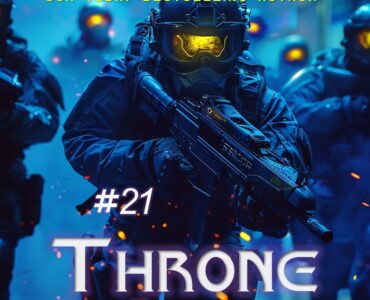Pros
- The same fun story readers have come to enjoy from Undying Mercenaries
- Lots of action and enough advancement of plot to keep the story moving forward
- Less deprecating humor from McGill and others that was annoying in previous books
Cons
- At Book 13, some of the stories are becoming a bit predictable
- McGill plays less of the jester and bumbling fool, and he’s more competent
Fans of the Undying Mercenaries series by B. V. Larson will continue to find a familiar comfort in Glass World. While McGill doesn’t age because of his constant battles and revivals, he appears refreshingly more mature in this book.
Plot
James McGill learns of the location of a highly valuable planet, and Legion Varus is sent to take control of the planet and its resources. Who is working to supply Rigel with nearly impenetrable armor? How is this armor produced? These questions are answered in Glass World.
Characters
James McGill and Legion Varus, along with other familiar characters, return in this new military adventure. Other characters include Abigail and some familiar aliens.
Setting
The story takes place on Earth and on a world simply known as Glass World.
Glass World Review
Despite some of my criticisms about the Undying Mercenaries series, namely some of McGill’s personality traits, I find myself coming back to the series every so often. It’s a nice, refreshing break from reading other science fiction stories, and the plot is often fairly predictable, with enough surprises to keep me engaged.
Glass World is no different from previous book in regards to the plot. Where it manages to do better is in portraying James McGill as less of a playboy—though I imagine readers will want this—and more like the experience soldier that he is. After all, he has decades of military experience and at least thirteen major campaigns under his belt.
So it was refreshing to see that the other characters in the book treated McGill with more respect. Earlier books in the series had characters, including McGill himself, constantly reminding readers how lucky the guy is.
But only so many seemingly serendipitous events can happen around McGill that readers start to question the “invisible” hand of the writer. Having that acknowledgement about McGill’s abilities makes the interactions with other characters more mature. But this acknowledgement also means that McGill can face more serious, more heinous, antagonists. And perhaps the plot can grow a bit more as well.
As McGill moves up in rank, there’s less focus on the battles taking place on the front lines. We’ve seen this in previous books, and there’s a clear difference between the later books, where McGill commands, and the early books, where McGill is thrown into the crossfire.
What Glass World does well is that it manages to keep the action surrounding McGill alive. Yes, he still has that amazing luck and that sometimes annoying obsession with sleeping with the women around him. But the writing surrounding this aspect of him is more toned down in this story. There’s even some dialogue near the end of the book with a certain clone that is surprising, if not somewhat hypocritical, about James McGill.
Will readers be surprised about the outcome of the military campaign? Likely, no. But to see Legion Varus and James McGill grow makes this book by B. V. Larson a worthwhile read in the Undying Mercenaries universe.
Read reviews on other books by B. V. Larson:



